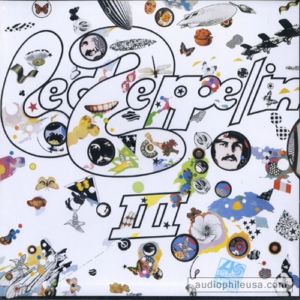
- Format: FLAC

Released 5 October 1970
Recorded January–August 1970 at various locations
Singles from Led Zeppelin III
1. "Immigrant Song/Hey Hey What Can I Do"
Released: 5 October 1970
Bron-Yr-Aur cottage
Many of the songs featured on the album were conceived in mid-1970 at Bron-Yr-Aur, an 18th century cottage in Gwynedd, Wales, on a hilltop overlooking the Dyfi Valley, three miles north of the market town Machynlleth. There, Led Zeppelin vocalist Robert Plant and guitarist Jimmy Page spent some time after a concert tour of the United States to play and compose new music. This remote setting had no running water or electric power, which encouraged a slight change of direction for the band towards an emphasis on acoustic arrangements. As Page later explained: "After the intense touring that had been taking place through the first two albums, working almost 24 hours a day, basically, we managed to stop and have a proper break, a couple of months as opposed to a couple of weeks. We decided to go off and rent a cottage to provide a contrast to motel rooms. Obviously, it had quite an effect on the material that was written ... It was the tranquility of the place that set the tone of the album. Obviously, we weren't crashing away at 100 watt Marshall stacks. Having played acoustic and being interested in classical guitar, anyway, being in a cottage without electricity, it was acoustic guitar time ... After all the heavy, intense vibe of touring which is reflected in the raw energy of the second album, it was just a totally different feeling."
Plant has expressed similar recollections: "[Bron-Yr-Aur] was a fantastic place in the middle of nowhere with no facilities at all-and it was a fantastic test of what we could do in that environment. Because by that time we'd become obsessed with change, and the great thing was that we were also able to create a pastoral side of Led Zep. Jimmy was listening to Davy Graham and Bert Jansch and was experimenting with different tunings, and I loved John Fahey. So it was a very natural place for us to go to."
After preparing the material that would emerge on the album, Page and Plant were joined by the other members of the band (drummer John Bonham and bass player John Paul Jones) at Headley Grange, a run-down mansion in East Hampshire, to rehearse the songs. With its relaxed atmosphere and rural surroundings, Headley Grange appealed to the band as the favoured alternative to the discipline of a conventional studio.
The album was then recorded in a series of sessions in May and June 1970 at both Headley Grange and at Olympic Studios, London. Some additional work was put in at Island Records' new Basing Street Studios in Notting Hill, London, in July, then mixed at Ardent Studios, Memphis in August 1970 during Led Zeppelin's sixth American concert tour. The album was produced by Page and engineered by Andy Johns and Terry Manning.
The album contains two songs which became key components of the band's live concert performances for many years: "Immigrant Song" and "Since I've Been Loving You". The first of these, written by Jimmy Page and Robert Plant, is about the Norse invasions of England and was inspired by the band's recent live performance in Iceland. "Since I've Been Loving You" is a classic, original blues in the key of C minor featuring heartfelt interplay by all four group members. It would become a live performance staple for the band, replacing the slow blues of "I Can't Quit You Baby" from the first album as the band's slow blues showcase.
Although the band's expanding musical boundaries were greeted warmly by some, detractors attacked the heavier tracks as being mindless noise, while the acoustic material was criticised by others for merely imitating the music of Crosby, Stills, Nash & Young. Page suggested that this comparison was unwarranted, stating in an interview he gave to Cameron Crowe that "when the third LP came out and got its reviews, Crosby, Stills and Nash had just formed. That LP had just come out and because acoustic guitars had come to the forefront all of a sudden: LED ZEPPELIN GO ACOUSTIC! I thought, Christ, where are their heads and ears? There were three acoustic songs on the first album and two on the second."
Page has also said that the negative press given to the third album affected him so much that he did not give press interviews for eighteen months after its release, and was also one of the reasons why the band's subsequent untitled album contained no written information on it at all. However, in more recent years, he has commented on the negative press reaction in somewhat more diplomatic terms: "[W]ith hindsight, I can see how if somebody got Led Zeppelin III, which was so different from what we'd done before, and they only had a short time to review it on the record player in the office, then they missed the content. They were in a rush and they were looking for the new "Whole Lotta Love" and not actually listening to what was there. It was too fresh for them and they didn't get the plot. So, in retrospect, it doesn't surprise me that the diversity and breadth of what we were doing was overlooked or under-appreciated at the time."
Production
* Peter Grant – executive producer
* Andy Johns – recording engineer, mixing engineer
* Eddie Kramer – mixing engineer
* Terry Manning – mixing engineer, mastering engineer
* Jimmy Page – production
* Paul Richmond – mastering